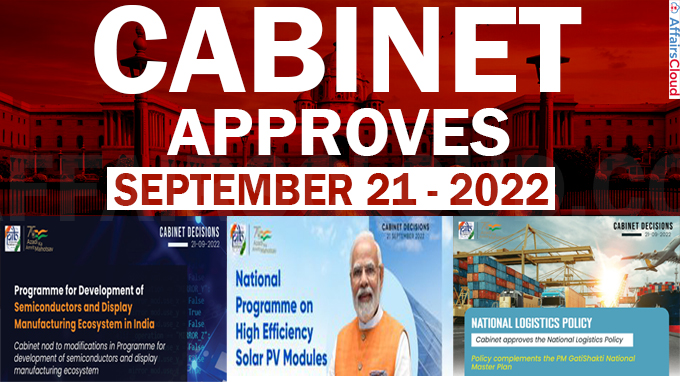
On September 21, 2022, the Union Cabinet chaired by the Prime Minister (PM) of India Narendra Modi has approved the following proposals which were detailed by Union Minister Anurag Singh Thakur, Ministry of Information and Broadcasting (MIB):
i.Introduces ULIP, Standardization, Monitoring framework and skill development for Greater Efficiency in Logistics Services
ii.Modifications in Programme for Development of Semiconductors and Display Manufacturing Ecosystem in India
iii.2nd tranche of PLI Scheme on National programme on High Efficiency Solar PV Modules
NLP introduces ULIP, Standardization, Monitoring framework and skill development for Greater Efficiency in Logistics Services
Recently, on September 17, 2022, PM Narendra Modi launched the National Logistics Policy (NLP) in Vigyan Bhawan, New Delhi (Delhi) that will act as a single point of reference for all logistics and trade facilitation matters. Click Here to Read
The Policy sets targets and includes a detailed action plan to achieve them. The targets are:
- to reduce cost of logistics in India to be comparable to global benchmarks by 2030,
- improve the Logistics Performance Index ranking, to be among top 25 countries by 2030, and
- create data driven decision support mechanism for an efficient logistics ecosystem.
Key Points:
i.To ensure the maximum reach of NLP important initiatives under the policy including Unified Logistics Interface Platform (ULIP), the Ease of Logistics Services platform, e-handbook on Warehousing, training courses on PM GatiShakti, skill development and logistics on i-Got platform, were also launched.
ii.To monitor the implementation of NLP, it will utilize the existing institutional framework i.e., Empowered Group of Secretaries (EGoS) created under the PM GatiShakti NMP (National Master Plan) .
- The EGoS will also set up Services Improvement Group (SIG) on the pattern of Network Planning Group (NPG) for monitoring of parameters pertaining to processes, regulatory and digital improvements in logistics sector
Cabinet approves modifications in Programme for Development of Semiconductors and Display Manufacturing Ecosystem in India
The Union Cabinet has approved the modifications in the Programme for development of semiconductors and display manufacturing ecosystem in India. The modifications include the following:
i.Fiscal support of 50% of Project Cost on pari-passu basis for all technology nodes under Scheme for Setting up of Semiconductor Fabs in India.
ii.Fiscal support of 50% of Project Cost on pari-passu basis under Scheme for Setting up of Display Fabs.
iii.Fiscal support of 50% of Capital Expenditure on pari-passu basis under Scheme for Setting up of Compound Semiconductors / Silicon Photonics /Sensors Fab and Semiconductor ATMP (Assembly Testing Marking and Packaging)/OSAT (Outsourced semiconductor assembly and test) facilities in India.
- Additionally, target technologies under the Scheme will include Discrete Semiconductor Fabs.
Reason behind Modification:
The Programme for development of semiconductors and display manufacturing ecosystem has attracted many global semiconductor players for setting up fabs in India. Now, the above mentioned modifications will expedite investments in semiconductor and display manufacturing in India.
Background:
An Advisory Committee comprising global experts from industry and academia was constituted to advise India Semiconductor Mission (ISM) which is the nodal agency for the Programme for development of semiconductors and display manufacturing ecosystem in India.
- This Advisory Committee has unanimously recommended uniform support for all technology nodes of silicon semiconductor fabs / Silicon Photonics / Sensors / Discrete Semiconductor Fabs and ATMP/OSAT, which has been accepted by the Government.
- This segment constitutes around 50% of the total semiconductor market.
Cabinet approves 2nd tranche of PLI Scheme on National programme on High Efficiency Solar PV Modules
The Cabinet also approved the 2nd tranche of Rs 19,500-crore Production Linked Incentive (PLI) scheme on ‘National programme on High Efficiency Solar PV (photovoltaic) Modules’ with an aim to attract Rs 94,000 crore investments in the sector.
Through this, PLI scheme it is expected that about 65GW (Giga Watt) per annum manufacturing capacity of fully and partially integrated, solar PV modules will be installed in India.
- While 29GW will be under the fully integrated plan, 18GW of solar plants will be integrated from wafers to modules, and another 18GW of plants integrated over cells and modules.
Aim:
i.To build an ecosystem for manufacturing of high efficiency solar PV modules in India
ii.To reduce import dependence in the area of renewable energy
Key Points:
i.The initiative is expected to reduce import substitution of about Rs 1.37 lakh crore.
ii.The key difference in PLI tranche-I and tranche-II is that the minimum efficiency that was previously permitted has now been increased by one percentage point.
iii.The PLI that will now be disbursed will be based on local value addition, efficiency and there will be a tapering factor over 5 years, means after 5 years industries will not be dependent on subsidies and have to become competitive on their own.
iv.Through this PLI, there will be direct employment of about 1,95,000 and indirect employment of around 7,80,000 persons.
v.Solar PV manufacturers will be selected through a transparent selection process.
Why is this scheme significant?
At present all manufacturing in the solar energy sector in India is restricted only to cells and modules. India currently has no manufacturing of solar wafers and polysilicon. Through this scheme, the government will boost solar parts manufacturing in all three categories with the bulk of the focus being on producing integrated units, and the other two being equally divided between wafers-polysilicon and cells-modules.
Point to be noted;
i.The Central government has set a target of 500GW of installed electricity capacity from non-fossil sources by 2030.
ii.Bids for the first tranche were awarded in November-December 2021 and it was for Rs 4,500 crore with a total integrated capacity of 8.7 GW.
Recent Related News:
i.The Union Cabinet approved the ratification of amendments to the Constitution of the Universal Postal Union (UPU) as contained in the 11th Additional Protocol to the Constitution signed during the 27th Congress of the Universal Postal Union held at Abidjan, Côte d’Ivoire from 9 to 27 August 2021.
ii.The Union Cabinet approved the “Widening access of the Traditional Knowledge Digital Library (TKDL) database to users, besides patent offices”.
About Ministry of Information and Broadcasting (MIB):
Union Minister– Anurag Singh Thakur (Constituency- Hamirpur, Himachal Pradesh)
Minister of State– Dr. Loganathan Murugan (Constituency- Madhya Pradesh)




